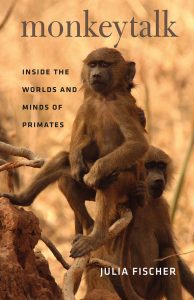#ReadUPScience: Monkeytalk(ing)

Check out an excerpt from a recent review of Julia Fischer’s Monkeytalk: Inside the Worlds and Minds of Primates, at Science News, after the jump.
***
“Fischer catapulted into a career chasing down monkeys in 1993. While still in college, she monitored captive Barbary macaques. That led to fieldwork among wild macaques in Morocco. In macaque communities, females hold central roles because young males move to other groups to mate. Members of closely related, cooperative female clans gain an edge in competing for status with male newcomers. Still, adult males typically outrank females. Fischer describes how the monkeys strategically alternate between attacking and forging alliances.
After forging her own key scientific alliances, Fischer moved on to study baboons in Africa, where she entered the bureaucratic jungle. Obtaining papers for a car in Senegal, for instance, took Fischer several days. She first had to shop for a snazzy outfit to impress male paper-pushers, she says. Fischer and her local guide then shuttled from one government official to another until a well-timed phone call from a local police chief to a key bureaucrat finally produced the forms.
Monkeys get the job done using their own brand of intelligence, Fischer writes. Macaques and baboons navigate their home regions expertly, discern small quantities and object sizes pretty well, and know who’s socially dominant over whom. These abilities are somewhat humanlike, but Fischer draws a bright line between monkeys’ and people’s social lives. Our primate relatives specialize in tracking comrades’ behaviors, she holds, rather than trying to infer others’ plans and desires. And unlike human groups, monkey communities don’t steadily accumulate knowledge and innovations or communicate in languagelike ways, Fischer contends.
So what if monkeys don’t write books or gossip about each other? Their social lives are complex enough to remain largely a mystery to humans, Fischer concludes. The gritty work of conducting long-term studies, especially in the wild, can illuminate the worlds inhabited by monkeys.”
***
To read more about Monkeytalk, click here.
To read the Science News review in full, click here.